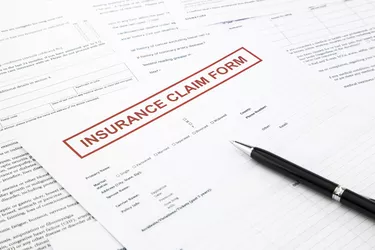
The life insurance claims process begins with notification, usually by a family member, to the insurance company about the policyholder's death. If you are the beneficiary, you will receive information and forms for filing the claim. The insurance company makes direct payment of life insurance proceeds only to a named beneficiary or to the deceased's estate.
Report the Death
Video of the Day
Generally, insurance companies allow you to report the death of a policyholder by telephone. Call the insurance company or the organization that provides the life insurance policy, such as the deceased person's employer. The claims representative will request information about the deceased, such as date and place of death, date of birth, Social Security number, marital status and address. Mail an original copy of the death certificate to the address provided by the representative. Your state's vital records office will provide a death certificate to a person, such as a child of the deceased person, who has a right to the information.
Video of the Day
Complete a Claim Form
Complete the claim form provided by the insurance company. Answer questions on the claim form about how you want your claim paid to you, such as a lump-sum payment or installment payments, if options are available. Each beneficiary named on the policy must complete and sign a claim form, also called a claimant's statement. If a parent named four children as beneficiaries and distributed 25 percent of the proceeds to each, the life insurance company will require a signed, notarized claim form from each child.
Claim Payment
Insurance companies usually process claims quickly when instructions are followed and a proper death certificate is provided. The insurance company will send a check made out to the beneficiary, unless arrangements are made for electronic funds transfer. Some life insurance companies require completion of IRS Form W-9, Request for Taxpayer Identification Number and Certification. Insurance companies uses Form W-9 if interest payments on the policy's value are made to you.
Assignment of Claim
If you are responsible for making funeral arrangements for the deceased person, and you are the beneficiary of the life insurance policy, you might choose to sign an insurance assignment contract with the funeral home. This arrangement is especially helpful if, as the child of the deceased, you need to move forward with funeral arrangements before a will or other legal considerations are made known. The funeral home provides an assignment form for you to complete and submits the form to the insurance company. The life insurance proceeds are paid to the funeral home, which deducts the cost of its services and forwards the balance of the proceeds to the beneficiary.
Beneficiary Issues
The deceased person's will does not determine payment of a life insurance claim. The life insurance company will pay the claim to the beneficiary named on the policy. If no beneficiary is named, or if the only beneficiary is deceased and no secondary beneficiary is named, life insurance proceeds are usually paid to the estate of the deceased person. The executor or administrator of the deceased person's estate files the insurance claim and provides the insurance company with information for payment to the estate.